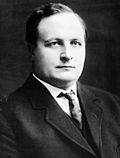November 7, 1922 | |||||||||||||||||
| |||||||||||||||||
 County results Nestos: 50–60% 60–70% 70–80% Lemke: 50–60% 60–70% 70–80% Tie: 50% | |||||||||||||||||
| |||||||||||||||||
| Elections in North Dakota |
|---|
 |
The 1922 North Dakota gubernatorial election was held on November 7, 1922. Incumbent Republican Ragnvald Nestos defeated Nonpartisan League nominee William Lemke with 57.65% of the vote.

